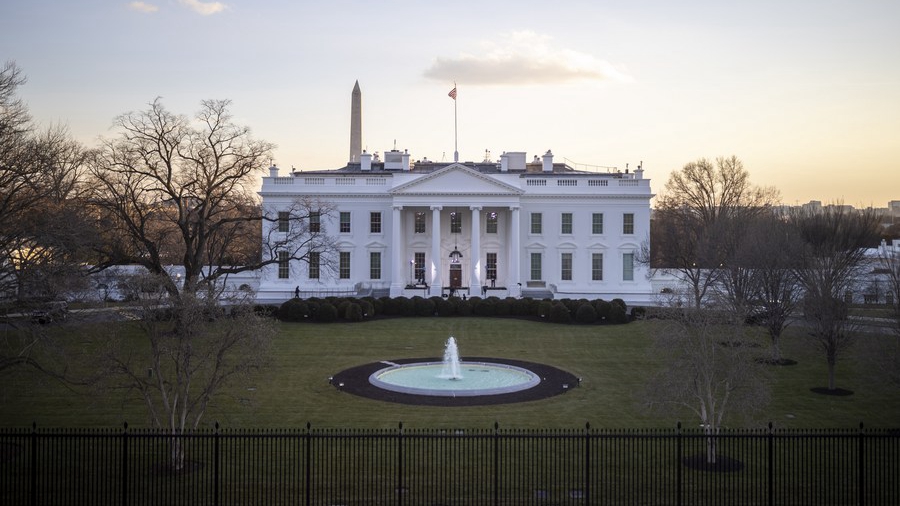
The White House in Washington, D.C., U.S., January 20, 2021. /Xinhua
The White House in Washington, D.C., U.S., January 20, 2021. /Xinhua
Editor's note: Hamzah Rifaat Hussain, former visiting fellow at the Stimson Center in Washington and former assistant researcher at the Islamabad Policy Research Institute, is a TV anchor at Indus News in Pakistan. The article reflects the author's opinions and not necessarily those of CGTN.
While it is undoubtedly true that sovereign legislation aimed at stimulating domestic economic activity and addressing global shocks and the effects of the pandemic is important, it also needs to be apolitical and focus on strengthening supply chains and delivering on electoral promises.
In America's case, the Biden administration with its Competes Act of 2022 has a clear anti-China bias, which detracts from the goal of reviving the U.S. economy through job creation and investing in manufacturing capacity. The question is – will the Biden administration ever relent in its anti-China obsession and focus on U.S. domestic issues apolitically?
Financial Services Committee Chairwoman, Maxine Waters, claimed that China and other "bad actors" are threatening America's national security and global financial stability, with Beijing accused of engaging in aggressive activities against the American financial system. This begs the question as to whether the Competes Act of 2022 is actually aimed at resuscitating the domestic American manufacturing base at all.
In a tweet, after the House of Representatives had pushed the act through, President Joe Biden also hinted at a deliberate attempt to include China in American aims of easing supply check bottlenecks and brought manufacturing jobs in the country. Taking aim at China through domestic legislation or building alliances with countries such as Japan to cut out technological exports does not address American localized economic difficulties, yet the Biden administration is hanging on to this misguided belief.

U.S. President Joe Biden visits Jeni's Ice Creams in Washington, D.C., January 25, 2022. /CFP
U.S. President Joe Biden visits Jeni's Ice Creams in Washington, D.C., January 25, 2022. /CFP
The legislation is a clear affront to calls for meaningful engagement with China, which can potentially allay lingering differences and diffuse tensions across the globe.
The other contours of the program also hint at a clear anti-China bias beyond exports of semiconductors. For example, the legislation directs the secretary of energy to establish programs within the United States to construct new solar component manufacturing facilities, whereas the investments enshrined in the act itself clearly aim at decreasing reliance on the Chinese solar supply chain.
Secondly, the statement issued from the White House by the president himself was to specifically target China and the rest of the world and affirm that the 21st century will be the American century constituting good paying jobs for average Americans.
The linkages drawn, however, do not make much sense as domestic job opportunities for average Americans have little to do with tackling China's supply chains and more with incentivizing growth.
If examined closely, funds worth $52 billion to encourage semiconductor production in the U.S., for example, comes just days after an alliance between Washington and Tokyo was aimed at regulating the exports of advanced technology to China, which includes semiconductor manufacturing equipment and artificial intelligence. This shows that outcompeting China is very much on the cards as far as the Biden Doctrine is concerned.
Examined further, the bill also authorizes $600 million per year to construct the adequate manufacturing infrastructure needed to make America less reliant on solar components made in China's Xinjiang Uygur Autonomous Region. What does that have to do with the purported aims of the bill, which, according to the president, is to power the U.S. economy in the 21st century and expand opportunities for middle-class families?
Again, there is no clear answer as pursuing hegemonic designs under the garb of stimulating domestic commercial activity will not address the Biden administration's pressing issues, which include inflationary pressures, apprehensions over how U.S. action on inflation could trigger a severe debt crisis, exorbitant student loans and massive income disparity, which lingers on racial lines today. Authorizing $190 billion for technology and research with the aim of outcompeting China does little to address these lingering economic quagmires.
The truth is that the U.S. has propped up anti-China legislation which coincides with brazen demonization of another state. By once again choosing to deftly link domestic economic woes with Beijing, the Biden administration has got it all wrong.
(If you want to contribute and have specific expertise, please contact us at opinions@cgtn.com.)

